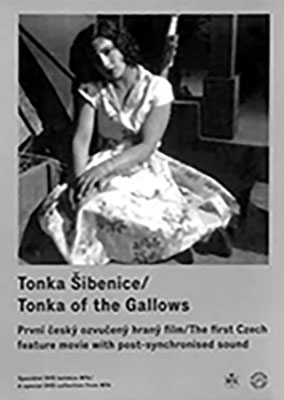
Reviews of silent film releases on home video.
Copyright © 1999-2024 by Carl Bennett
and the Silent Era Company.
All Rights Reserved. |
|
Tonka of the
Gallows
(1930)
|
This late silent era drama was directed by Karel Anton and stars Yugoslavian actress Ita Rina, Russian actress Vera Baranovskaia, and Josef Rovenský and John Mylong-Münz.
Tonka, a small town girl (Rina), returns home for an idyllic visit with her mother (Baranovskaya) and a former suitor (Mylong) but is soon drawn back to the big city, where she resumes her work as a prostitute.
One evening, police visit the brothel with an unusual request for the working girls there. A death-row inmate has requested a visit from a woman before his hanging. The girls are repulsed by the thought, except for the fatalistic Tonka who is taken by police to the prison. The murderer inmate (Rovenský) is distressed that he has been paired with such a young girl but Tonka’s compassion for the man leads to a desperate bond.
Even though no intercourse was undertaken, Tonka is subsequently shunned by former customers and ridiculed by the other prostitutes. Tormented by her own sadness and by the thoughtlessness of others, the morose Tonka is cast out by the house madam. One evening, she is found on the streets by Jan, Tonka’s small-town suitor, who convinces her to return home and they will be married.
Everything is well until a former customer of Tonka’s, a traveling salesman (Felix Kühne), appears in town and stumbles into a conversation with her fiancé. Tonka’s notorious identity is accidently made known to Jan, who is shocked and angered by the revelation. Shunned now by fiancé, mother and townspeople, Tonka returns to the city where she leads a solitary and tragic existence as an alcoholic streetwalker.
Originally shot in Prague late in 1929 as a silent production, before its release the film was post-synchronized in Paris with the addition of music, sound effects, and two lip-synched songs performed by Ita Rina and an uncredited vocalist.
Director/producer Karel Anton turns in a very good film with atmospheric cinematography by Eduard Hoesch, which is full of rich shadows contrasted by intelligently lit actors, unexpected camera movement, double-exposure and the occasional high and low-angle shot.
Ita Rina turns in a very good performance, but we are most impressed with that of Vera Baranovskaia, best remembered for her starring role in Mother (1926), who is wonderfully expressive and engaging as Tonka’s mother.
— Carl Bennett |
 Národní Filmový Archiv Národní Filmový Archiv
2016 DVD edition
Tonka of the Gallows (1930), black & white, 83 minutes, Rated U.
Národní Filmový Archiv, distributed by Filmexport Home Video, 9661 (spine number 147), UPC 8-595052-296614.
One single-sided, dual-layered, Region 0 PAL DVD disc, 1.20:1 aspect ratio image in 16:9 (720 x 576 pixels) interlaced? scan MPEG-2 format, SDR (standard dynamic range), 6.6 Mbps average video bit rate, 192 Kbps audio bit rate, Dolby Digital 48 kHz 2.0 stereo sound, French language intertitles, optional Czech and English language subtitles, 5 chapter stops; plastic DVD tray in cardboard wraps, 24-page insert booklet; unknown suggested retail price.
Release date: 2016.
Country of origin: Czechoslavakia
Ratings (1-10): video: 7 / audio: 7 / additional content: 7 / overall: 7.
|
|
This Region 0 PAL DVD edition has been transferred from 35mm restoration print materials of the French language version of this post-synchronized sound film. Having been shot as a silent film, the surviving image is cropped on the left side of the frame to make way for the optical soundtrack in the original prints. This is an occasionally distracting detriment to experienced eyes, as the intended composition is compromised, but most viewers will nonetheless not be conscious of this. The source print itself has been (presumably photochemically) preserved with no apparent digital clean-up since the image shows occasional print flaws of emerging decomposition, mild frame jitters, timing marks, and the more persistent scratches, scuffing, dust and speckling in the picture. As the film was shot at a traditional silent camera speed and was converted to 24 frames per second for optical sound film prints, the action runs at slightly faster than natural speed.
The film is accompanied by its original music score by Erno Košťál, a utilitarian effort that is a historical product of its time.
The supplemental material includes a surviving fragment of the Czech sound prologue featuring singer Karel Hašler performing his song “Hradčany krásné”, an excerpt from a 1932 newsreel again featuring Karel Hašler performing his song “Princezna v hermelínu”, footage of the aftermath of the 1929 Kavalírka studio fire which delayed production of Tonka of the Gallows, and three video pieces on the context of the film with historians Petr Szczepanik (18 minutes), Ivan Klimeš (10 minutes) and Blažena Urgošiková (10 minutes) which are presented with optional English language subtitles. An insert booklet contains articles in Czech and English.
North American collectors will need a region-free PAL DVD player capable of outputting an NTSC-compatible signal to view this edition.
|
|
USA: Click the logomark to purchase this Region 0 PAL DVD edition from Amazon.com. Your purchase supports Silent Era.
|

|
|





































